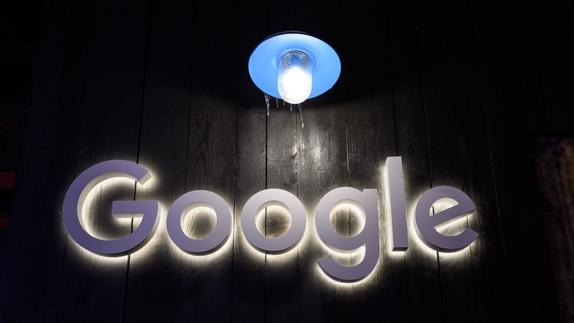 A sign of Google is seen at Google's stand during the annual meeting of the World Economic Forum in Davos, on Jan 21, 2020. (PHOTO / AFP)
A sign of Google is seen at Google's stand during the annual meeting of the World Economic Forum in Davos, on Jan 21, 2020. (PHOTO / AFP)
Google agreed to pay 220 million euros (US$268 million) and change the way its business works across the world after settling a France probe that struck at the heart of its power over online advertising.
France’s antitrust agency said Monday the US tech giant used its dominance over ad sales and purchasing on its platforms to distort the market to its own advantage, hurting publishers such as News Corp.
“Google took advantage of its vertical integration to skew the process,” Isabelle de Silva, who heads France’s Autorité de la concurrence, said at a Paris press conference on Monday. She described Google’s behavior as “particularly serious.”
France’s antitrust agency said Monday the US tech giant used its dominance over ad sales and purchasing on its platforms to distort the market to its own advantage, hurting publishers such as News Corp
The decision is a rare look inside the black-box of online advertising where Google automatically calculates and offers ad space and prices to advertisers and publishers as a user clicks on a web page. Google also entered a pledge to remedy the situation by making sure its Google Ad Manager services work more smoothly for third parties.
ALSO READ: Google sees sweeping German antitrust probes into data terms
The French authority criticized Google for favoring its DoubleClick for Publishers ad server where publishers sell ad space and its AdX or DoubleClick Ad Exchange where publishers sell page impressions to advertisers.
To remedy the situation, Google has pledged to make sure competing platforms serving publishers can properly access the Google server for advertisers and allow the rivals compete fairly with Google to buy publishers’ ad space.
Google also said it will make changes to allow publishers using rival ad servers to access Google’s Ad-X in real time.
De Silva said that Google intends to apply some of these commitments at a worldwide level.
With separate cases into Google, Apple Inc and Facebook Inc, French antitrust regulators are starting to rein in anti-competitive behavior in online advertising. While Google’s case ended with a fine, Facebook last week tried to avoid that by making commitments to placate regulators.
ALSO READ: Australia's Nine signs FB, Google deals under new licensing regime
Google said in a blog post it’s “committed to working proactively with regulators everywhere to make improvements to our products.” The company said it will be testing and developing behavioral changes agreed as part of the settlement over the coming months.
The Google case stems from a complaint lodged in 2019 by News Corp., the group behind French newspaper Le Figaro and media firm Groupe Rossel la Voix SA. Le Figaro group decided to withdraw from the case in November 2020.
“For years there was a fear of taking on these platforms because they were too powerful,” said de Silva said on Monday. She added that she fully expects damages requests to be lodged following the regulator’s decision.
French Finance Minister Bruno Le Maire said it’s “essential” tech giants heed the country’s competition rules. He pointed out that Google’s behavior “impacted” media groups whose “economic model is strongly dependent on advertising revenue.”
The case sprang from a study the French Competition Authority published in 2018 after conducting a sector inquiry into online advertising, which put the spotlight on the power of Google and Facebook.
ALSO READ: Google accused of abusing power in landmark antitrust case
Google has already attracted French antitrust scrutiny over online advertising in the past, with a 150 million-euro fine in 2019. The search engine also risks a penalty in the coming weeks over suspicions it failed to comply with an order relating to its news service.
The French settlement is the latest in a series of efforts to crack down on Silicon Valley’s market dominance across the continent. Last week, Google’s news service was targeted by a German probe. The EU and the UK also opened investigations into Facebook over how it uses some information from advertisers.
Ahead of the weekend’s landmark G7 tax agreement, tech firms have also faced intense scrutiny over their tax affairs, amid criticism that they don’t pay their fair share, despite racking up massive sales in the region.


